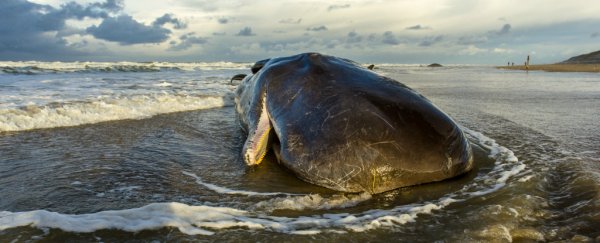Scientists have discovered 29 kilos of plastic in the stomach of a sperm whale, which washed up on the southern coast of Spain in February.
During an autopsy of the 10-metre-long male whale, experts from the El Valle Wildlife Recovery Center uncovered plastic bags, a jerry can, and several pieces of rope and net.
After full examination, the experts agreed that the sperm whale had died because it could not expel the plastic it had swallowed.
They theorised that the blockage in the whale's digestive system caused an infection of the abdomen, called peritonitis, that ultimately resulted in the mammal's death.
As shocking as the discovery is, it's really not. When over 8 million tons of plastic enter the world's oceans every year, it's no coincidence that 29 kilos of it show up in the stomach of a sperm whale.
#MedioAmbiente lanza una #campaña para concienciar sobre el peligro de las #basurasmarinas para la #Fauna Ejemplo: La necropsia de un #Cachalote varado 🐋 detectó en su aparato digestivo 29 kg de basura 😢#StopBasurasMarinas #Concienciación ♻️+inf: https://t.co/mLjhNreLlx pic.twitter.com/dqejUXFkWS
— Espacios Naturales Región de Murcia (@EspNaturalesMur) April 4, 2018
Since the results of the autopsy, the whale's death has spurred the government in Murcia, Spain to launch an awareness campaign on the dangers of single use plastics.
"The presence of plastics in seas and oceans is one of the greatest threats to the conservation of wildlife throughout the world, since many animals are trapped in the trash or ingest large amounts of plastics that end up causing their death," said Consuelo Rosauro, director-general of the natural environment in the Murcian government.
"The region of Murcia is no stranger to this problem, which we must tackle through clean-up actions and, above all, citizen awareness."
Just a month ago, a scientific team reported that 79,000 tons of plastic debris now occupy an area in the Pacific Ocean about three times the size of France.
By 2050, it's predicted there will be more plastic than fish in our oceans.
Keeping these facts in mind, it should come as no surprise that the Murcia sperm whale has good company. There are myriad examples of whales washing up on the beach with stomachs full of plastic – plastic that can contain toxic substances like heavy metals.
But thanks to David Attenborough, humans are starting to pay attention. Footage from the show Blue Planet II, which featured a whale calf dying from plastic pollution, has encouraged many to give up single-use plastics – including the Queen of England, the Scottish Parliament and the BBC.
As the voice of the series, Attenborough warned viewers that "unless the flow of plastics into the world's oceans is reduced, marine life will be poisoned by them for many centuries to come."
And the good news is, the war on single-use plastics is working.
A recent report from the Centre for Environment, Fisheries and Aquaculture Science (Cefas) found that measures to reduce plastic use have a direct impact on ocean ecosystems.
For instance, small charges on plastic bags at supermarkets have led to an 80 percent drop in plastic bag use across England.
"It is encouraging to see that efforts by all of society, whether the public, industry, NGOs or government to reduce plastic bags are having an effect," Dr Thomas Maes, a marine litter scientist at Cefas and the report's lead author, told The Independent.
If humans, corporations and governments can continue to mobilise around environmental issues like single-use plastics, the future of ocean ecosystems could turn from grim to hopeful.
